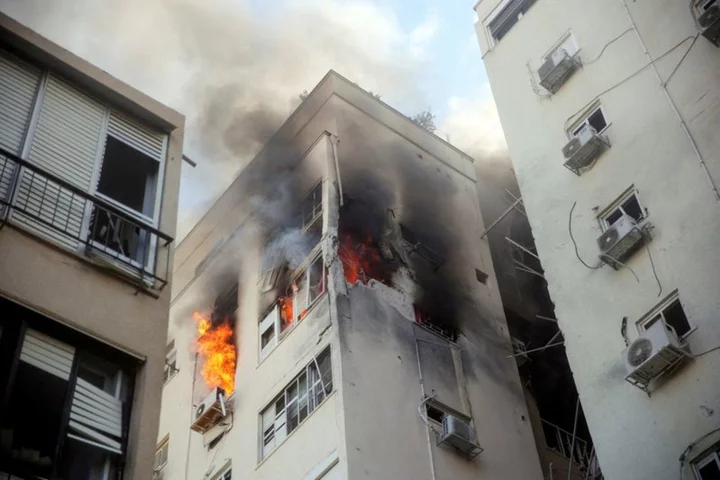By Steven Scheer
JERUSALEM Israeli stock and bond prices slid and many businesses were closed on Sunday, a day after Hamas gunmen from Gaza killed hundreds of Israelis and abducted an unknown number of others.
Key Tel Aviv share indices fell as much as 7% and government bond prices fell up to 3% in the market's initial response to the bloodiest attack on Israel in decades.
While the foreign exchange market is closed on Sundays, the shekel is already at its weakest level of the year due to a highly contested government plan to overhaul the judiciary.
"This round of violence is expected to be more prolonged and severe than previous ones, clearly having a more negative impact on the economy and the fiscal budget," said Jonathan Katz, chief economist at Leader Capital Markets.
"The shekel will most likely weaken sharply tomorrow and we see a high probability that at some point the Bank of Israel will sell FX."
Gunmen from the Palestinian group Hamas rampaged through Israeli towns on Saturday, killing at least 400 Israelis, before abducting dozens of hostages and returning to Gaza.
Israel has retaliated with air strikes on Hamas targets in Gaza.
Gaza militants also fired thousands of rockets into Israel, some reaching as far as Tel Aviv, prompting airlines to suspend flights to and from Israel.
Finance Minister Bezalel Smotrich said he had directed heads of ministry departments to quickly provide the budgets required for the management of the war.
AIR TRAVEL DISRUPTIONS
Delta Air Lines said flights from Israel to New York and Atlanta were cancelled through Monday, while United Airlines said "future operations at TLV (airport) will be suspended until conditions allow them to resume." Air India said flights to and from Tel Aviv would be suspended until Oct. 14.
United Airlines' smaller rival Arkia said it was operating rescue flights from Athens to bring back Israelis who had been on vacation.
Another rival Israir said it was operating rescue flights from Larnaca in Cyprus but warned it may operate a reduced schedule in the coming days as foreign crew on some of its leased aircraft have asked to leave Israel.
Nvidia, the world's largest maker of chips used both for artificial intelligence and for computer graphics, said it had cancelled its AI summit in Tel Aviv next week, where CEO Jensen Huang was scheduled to speak.
Schools were shut and many companies gave workers the day off, and most stores other than supermarkets and pharmacies were closed.
Israel's Manufacturers' Association said factories were still working despite the state of emergency to ensure there was no fear of a lack of food and other essential products.
"All companies will continue to operate as much as possible despite the difficult emergency conditions, the rocket barrages and the resulting shortage of workers," said association president Ron Tomer. "Thanks to Israel's production independence ... even in times of emergency, the residents of Israel will lack nothing."
Intel Corp, Israel's largest employer and exporter, declined to say whether chip production was affected.
"We are closely monitoring the situation in Israel and taking steps to safeguard and support our workers," a spokesman said.
Tower Semiconductor said it was operating as usual.
(Reporting by Steven Scheer; Editing by Bernadette Baum)

